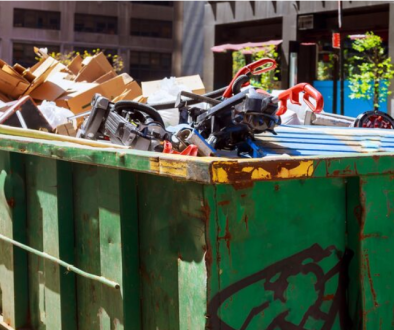Asbestos, once hailed as a “miracle material” for its fire-resistant properties and tensile strength, is now a known cause of several serious respiratory and lung diseases, including mesothelioma cancer. With the undeniable evidence of its harmful impact on human health, asbestos has been banned in the UK since 1999. However, asbestos-containing materials (ACMs) can still be found in older buildings constructed prior to the ban, posing significant health risks during renovations and demolitions.
For construction professionals or DIY enthusiasts working on older properties, it is essential to understand how to identify materials containing asbestos, safely handle and dispose of them according to UK regulations, and minimise health risks associated with exposure. In this detailed guide, we will discuss the importance of proper asbestos management and disposal in construction, outline the responsibilities of property owners and builders, and provide practical tips to ensure safe and compliant asbestos disposal. We will also introduce Enviro Skip Hire, a reliable waste management service that can assist you in safely and legally disposing of asbestos waste.
Join us in exploring the critical aspects of asbestos management in construction, arming yourself with essential knowledge to ensure that your project proceeds with the highest regard for safety, health, and legal compliance. Contribute to keeping the risks of asbestos exposure at bay by partnering with Enviro Skip Hire for responsible waste management services that prioritise both safety and environmental stewardship.
Understanding the Dangers of Asbestos Exposure
Asbestos exposure presents a significant risk to both human health and the environment. When disturbed, asbestos-containing materials can release microscopic fibres into the air, which can cause severe respiratory and lung diseases if inhaled. The most common asbestos-related conditions include:
1. Asbestosis: A chronic lung disease that manifests as scarring of the lung tissue over time, leading to shortness of breath, chest pain, and long-term respiratory complications.
2. Mesothelioma: A malignant cancer that affects the lining of the lungs, chest cavity, and abdominal cavity. Mesothelioma has a long latency period and is often diagnosed at a late stage, making it highly fatal.
3. Lung Cancer: Prolonged exposure to asbestos fibres increases the risk of developing lung cancer, particularly in those who smoke or are exposed to other carcinogenic substances.
4. Non-Malignant Pleural Disease: Asbestos exposure can contribute to pleural thickening, pleural plaques, and pleural effusions, causing discomfort and restricted lung function.
UK Asbestos Regulations and Responsibilities
Due to the severe health risks associated with asbestos, specific regulations govern its management and disposal in the UK. The Control of Asbestos Regulations 2012 outlines the responsibilities of property owners, employers, and contractors in ensuring the safe handling and disposal of asbestos waste:
1. Risk Assessment: Before commencing any renovation or demolition work, it is essential to conduct a thorough asbestos risk assessment to identify and manage the presence of any asbestos-containing materials. This process should be carried out by a qualified asbestos surveyor.
2. Asbestos Management Plan: If asbestos is identified during the risk assessment, an asbestos management plan (AMP) must be developed and implemented. This should detail the locations of ACMs, the means of containing or removing them, and how they will be managed to prevent unnecessary exposure.
3. Training: Those working with asbestos-containing materials must receive appropriate training in asbestos management and handling, ensuring they are equipped to safely deal with ACMs on-site.
4. Waste Disposal: Any removed asbestos waste must be handled by an authorised waste carrier and disposed of at an authorised waste disposal facility. Stringent guidelines must be followed during the waste transport and disposal process, ensuring that asbestos is safely and securely contained.
Practical Tips for Safe Asbestos Disposal
To ensure the safe and responsible disposal of asbestos-containing materials, follow these practical guidelines:
1. Protective Equipment: Always wear appropriate personal protective equipment (PPE) when working with or handling asbestos, including respiratory masks, disposable coveralls, gloves, and safety goggles. Ensure that PPE is worn correctly and disposed of at an authorised waste facility.
2. Contain Asbestos Dust: Use a water spray to dampen the asbestos-containing materials, reducing the risk of airborne fibres during removal. Avoid pulverising, sanding or sawing materials that may contain asbestos, as these activities can generate dust.
3. Double-Bag Asbestos Waste: Use two durable, clear polythene bags to double-bag the asbestos waste. Ensure each bag is appropriately sealed, marked with the correct hazardous waste label, and secured during transportation.
4. Dispose of Decontamination Material: All disposable materials used during asbestos removal, including protective clothing, filters, and rags, must also be double-bagged and treated as hazardous waste.
Benefits of Working with Enviro Skip Hire for Asbestos Waste Disposal
Partnering with a trusted waste management service like Enviro Skip Hire can significantly simplify your asbestos disposal process and ensure full legal compliance:
1. Licensed Waste Carrier: Enviro Skip Hire is a licensed waste carrier authorised to handle and dispose of hazardous waste, including asbestos-containing materials, ensuring that your waste is dealt with safely and according to regulations.
2. Expert Guidance: The Enviro Skip Hire team provides expert advice and support throughout the asbestos disposal process, assisting with risk assessments, waste management plans, and obtaining necessary permits.
3. Eco-Friendly Waste Management: With a strong commitment to environmental stewardship, Enviro Skip Hire focuses on recycling and reusing materials wherever possible, minimising the impact on the environment.
Conclusion
The responsible handling and disposal of asbestos-containing materials during construction, renovation, or demolition projects are crucial for safeguarding human health and the environment. By familiarising yourself with the dangers of asbestos exposure and adhering to the established UK regulations, you can mitigate the risks associated with asbestos and ensure your project runs smoothly and safely.
Partner with a reliable waste management service like Enviro Skip Hire to ensure your asbestos waste is disposed of safely, responsibly, and in compliance with all applicable regulations. Trust in the expertise, commitment to safety, and environmentally-focused approach offered by Enviro Skip Hire, and enjoy the confidence that comes with entrusting your asbestos disposal to a knowledgeable and reputable service provider. Hire a skip today!




